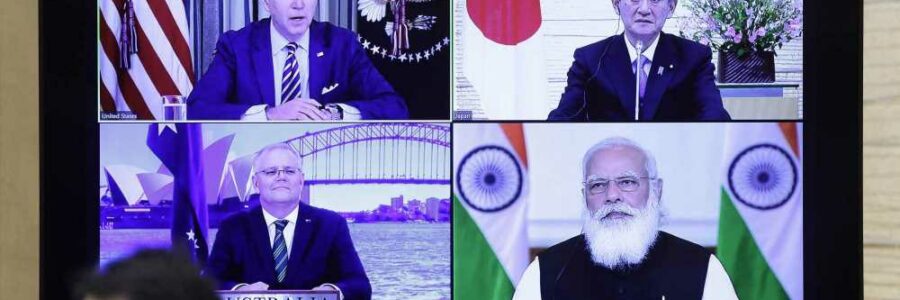
The U.S. is looking to convene in-person Quad meeting in the fall focused on infrastructure
- The United States is looking to convene an in-person fall summit of leaders of the Quad countries — Australia, India and Japan — with a focus on infrastructure in the face of the challenge from China, President Joe Biden's Indo-Pacific policy coordinator said on Wednesday.
- The March Quad summit was carefully choreographed to counter China's growing influence and Biden and his fellow leaders pledged to work to ensure a free and open Indo-Pacific in the face of challenges from Beijing.
- They also agreed to hold an in-person summit this year. A White House official said it had yet to be decided where or exactly when the summit would be held.
The United States is looking to convene an in-person fall summit of leaders of the Quad countries — Australia, India and Japan — with a focus on infrastructure in the face of the challenge from China, President Joe Biden's Indo-Pacific policy coordinator said on Wednesday.
Kurt Campbell said other countries were welcome to work with the Quad, which held a first virtual summit in March and pledged to work closely on Covid-19 vaccines, climate and security.
"We want to look this fall to convene an in-person Quad and the hope will be to make a similar kind of engagement on infrastructure more generally," Campbell told an online event hosted by Stanford University.
"And I do want to underscore … this is not a fancy club. If there are other countries that believe that they'd like to engage and work with us, the door will be open as we go forward," Campbell said.
The March Quad summit was carefully choreographed to counter China's growing influence and Biden and his fellow leaders pledged to work to ensure a free and open Indo-Pacific in the face of challenges from Beijing.
They also agreed to hold an in-person summit this year. A White House official said it had yet to be decided where or exactly when the summit would be held.
Campbell said there was now a new set of strategic parameters when it came to China and "a period that had been broadly described as engagement has come to an end."
"The dominant paradigm is going to be competition. Our goal is to make that a stable, peaceful competition that brings out the best in us," he said, while cautioning: "There will likely be periods ahead, in which there will be moments of concern."
Campbell said the "operating system" the United States had helped build in Asia remained intact but was "under substantial strain" in the face of China's rise.
"It's going to need to be reinvigorated in a number of ways, not just by the United States, but other countries that use the operating system and that means Japan, that means South Korea, Australia, countries in Europe that want to do more in Asia and across the board."
Campbell said it was important for the United States to have a "positive economic vision of what it wants to contribute, what it wants to engage on in Asia."
"We can do everything right in Asia, but without an economic strategy, it's hard to be successful. That's what Asians are looking for as we go forward … we're ambitious about the Quad."
Biden, who is pushing for big infrastructure spending at home, said in March he had suggested to British Prime Minister Boris Johnson that democratic countries should have an infrastructure plan to rival China's Belt and Road Initiative.
Belt and Road is a multi-trillion-dollar infrastructure scheme launched in 2013 by China's President Xi Jinping involving projects from East Asia to Europe and seen as a means of significantly expanding Beijing's economic and political influence.
Source: Read Full Article